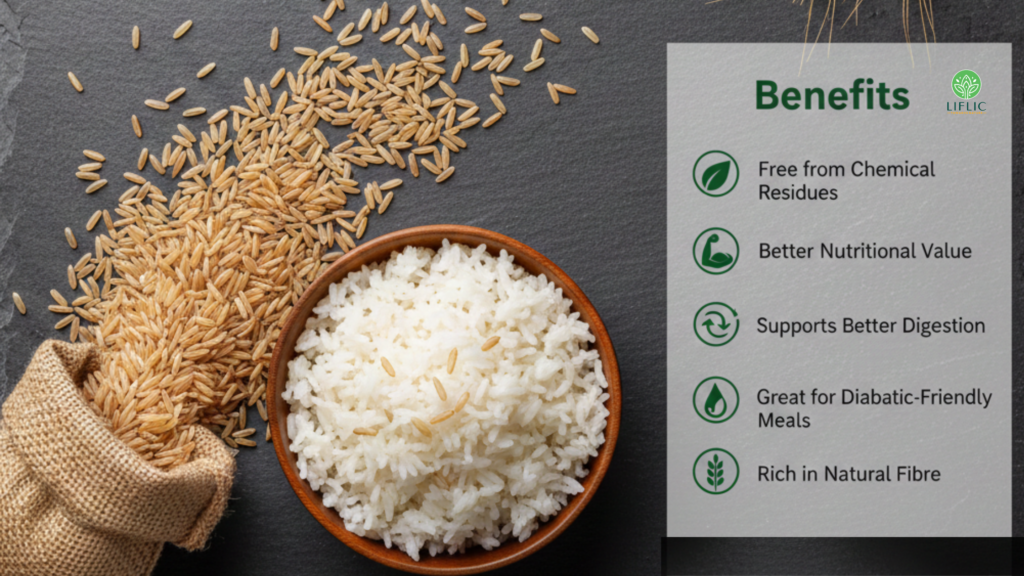
Organic Rice is gaining huge popularity as people become more conscious about health the food they eat and the way it is grown. It represents a return to traditional farming values clean soil, natural cultivation methods, and chemical-free produce. While rice has always been a staple food across many cultures, the renewed interest in organic rice reflects a shift toward healthier, sustainable, and more responsible eating habits.
Rice has been cultivated for thousands of years, with early records showing its origin around ancient river civilizations of Asia. In those early times, all farming was naturally “organic” because chemical fertilizers and synthetic pesticides did not exist. Farmers relied on natural compost, animal manure, crop rotation, and seasonal cycles to grow rice.
As agriculture modernized, chemical inputs became widely used to increase production and meet global food demand. While these practices boosted yields, they also led to soil degradation, water contamination, and food safety concerns.
This shift created a global movement that encouraged people to return to natural farming methods.
The concept of organic farming emerged formally in the early 20th century, emphasizing:
Today, Organic Rice represents a modern revival of ancient agricultural wisdom, combining old methods with improved scientific understanding.
What Makes Rice ‘Organic’?
Organic Rice is cultivated without:
Instead, farmers rely on natural soil-building techniques, organic manure, compost, and traditional pest control solutions. The entire process is monitored under strict organic standards to ensure purity and authenticity.
Why People Prefer Organic Rice Today?
Growing awareness about health and sustainability has made Organic Rice a preferred choice worldwide. Consumers want food that is clean, safe, and nutritious, and Organic Rice perfectly fits this expectation.
Key Benefits of Organic Rice
Organic Rice is grown naturally, ensuring no harmful chemical traces enter your meals.
Organic Rice maintains its natural mineral profile, offering better fiber, antioxidants, magnesium, and iron.
Chemical-free cultivation makes it gentle on the digestive system, suitable even for people with sensitive stomachs.
Organic farming protects soil fertility, maintains biodiversity, and reduces water pollution.
Organic Rice preserves the original flavour of the grain, making meals more aromatic and satisfying.
Types of Organic Rice
– Organic Long-Grain Rice: Light, fluffy, and ideal for daily meals.
– Organic Brown Rice: A whole-grain variety with high fiber, supporting digestion and energy levels.
– Organic Red Rice: Contains natural pigments and antioxidants that support overall wellness.
– Organic Black Rice: Rich in plant-based nutrients; known for its deep colour and unique taste.
– Organic Short-Grain Rice: Soft and sticky, suitable for traditional dishes and desserts.
How Organic Rice Is Cultivated?
Farmers use compost, cow dung, plant residues, and green manure to enrich the soil.
Only naturally preserved or heirloom seeds are used.
Farmers use neem sprays, herbal mixtures, fermented organic solutions, and biological pest traps.
Weeds are controlled manually or through natural mulching, avoiding harmful herbicides.
Organic farms often use water-efficient methods and rotate crops to keep fields healthy.
Grains are harvested naturally and stored without chemical preservatives.
Importance of Rice in Human Civilizations
Rice has played a major role in shaping cultures, economies, and traditions. It has been:
Traditional rice cultivation was deeply connected to nature, community labour, and seasonal rhythms. Organic farming today keeps this spirit alive by protecting the natural balance of ecosystems.
Why Organic Rice Is Becoming Popular Again?
People are concerned about lifestyle disorders, food contamination, and the long-term effects of chemicals in farming. This awareness has revived interest in natural, clean, and sustainable food making Organic Rice a modern necessity rather than a niche choice.
FAQs About Organic Rice
Yes. Organic Rice may take slightly longer to cook because it is unpolished and free from processing chemicals.
Yes, better nutritional value and fewer toxins, making it a safer and healthier choice for regular consumption.
Whole-grain organic varieties like brown, red, and black rice are naturally high in fiber.
Yes. It is suitable for daily meals and supports long-term wellness.
Organic farming requires more manual effort, natural inputs, and certification processes, which increases overall production costs.
Look for organic certification symbols and ensure the rice comes from reliable, verified sources.
Organic Rice | Organic Brown Rice | Organic Red Rice | Organic Black Rice | Buy Organic Rice Online | Organic Rice Benefits | Natural Farming | Chemical-Free Rice
Copyright © 2025 Magar Natural Food | All Rights Reserved